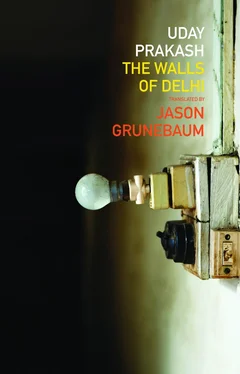The veins of Muktibodh’s forehead were throbbing and his hands were shaking. He seemed uneasy and stood up, and seeing that his bidi had gone out he took a pack of matches from his pocket and lit it up again.
‘All ideas have their end. When intellectual and philosophical systems that at one time created a lot of change are transplanted into another, what happens is sometimes they can be transformed into totally hollow jargon, senseless bullshit, the ramblings of rogues. It’s happened time and again throughout history. And yet…’
He puffed on his bidi and held the smoke in his lungs for a long time. Maybe he wanted the nicotine to quiet the restlessness in his breathing. He began to cough. He pressed his left hand to his chest, and then said in a scratchy voice, ‘But there’s something in man, this strange thing, that no matter when, no matter what kind of power is trying to come down on him, it will never destroy him. And that thing’s the quest for justice. The desire for justice is indestructible and timeless.’
He tossed the bidi he’d stuck between his index and middle fingers out the window. It had gone out.
Harshvarddhan Soni was confused. What kind of a person was this? To meet this kind of person disguised as a judge in this day and age seemed like an impossibility, a fantasy with a one-in-a-million chance of being real.
The judge was nervously pacing the room, but stopped suddenly — a bright, shining, mischievous twinkle now gleamed in his eyes that glowed like hot lead.
‘It’s OK, Harshvarddhan, don’t feel like you need to stay, and please, don’t worry. I know you haven’t been able to sleep for the past few nights, just like me.’ A huge smile spread over his face. ‘Partner, you can sleep without worrying about a thing. Sleep like a dead horse. Now I’ve got to work on a little something. ’
He approached Harshvarddhan and placed his hand on his shoulder; Harshvarddhan felt as if the hand had no weight at all. It was a hand made of paper, flowers, a dream, or language.
Gajanan Madhav Muktibodh, judge (first class), quietly whispered into Harshvarddhan’s ear: ‘There is one power that I have, one and only one power. That is… “secret judicial inquiry.” I can myself make inquiries. Just leave it to me.’
When Harshvarddhan walked out of Muktibodh’s flat it was as if he was emerging from a cave of dreams and returning to his own time and reality: the one with Mohandas, Bisnath, himself, and the realities of today.
A short four days later, Viswanath and his father Nagendranath were arrested and sent to jail by order of G.M. Muktibodh, judge (first class), and, in accordance with sections 419, 420, 468, 467, and 403, were charged with counterfeiting, fraud, racketeering, theft, and embezzlement. The court ordered S.K. Singh, CEO of Oriental Coal Mines, to immediately begin official proceedings against Mohandas Vishwakarma, aka Vishwanath, deputy depot supervisor, and to report the findings of the proceedings to the court in two months’ time. On top of this, proceedings and investigations should be launched in all concerned departments and divisions of the company against all managers and workers affiliated and connected with the matter either directly or indirectly. If the Oriental Coal Mines wanted to pursue the cases separately under criminal law, then this court would support such actions.
The news caused a huge stir. The arrest of the fake Mohandas was printed on page one of the newspapers. It sent ripples not just through the Oriental Coal Mines, but among officials and union leaders and workers in all sorts of factories and public sector enterprises. Several officials and workers were suspended. Others went on extended holiday. Everywhere there was panic and confusion. Thousands of Bisnath-like individuals had stolen the identities, qualifications, and abilities of others in desirable residential colonies like Lenin Nagar, Gandhi Nagar, Ambedkar Nagar, Jawahar Nagar, Shastri, Nehru, and Tilak Nagar — and had worked in their places for years, earning thousands of rupees with each pay cheque.
It turned out that Gajanan Madhav Muktibodh, judge (first class), Anuppur (M.P.) had invoked his emergency security power, and he himself had conducted a ‘secret investigation’ into the matter.
That night, he’d stayed up late reading. At nine in the morning he phoned his driver and instructed him to bring the government car that, up until then, he’d used only to drive to and from court. He made another call to H.S. Parasi (Harishankar Parasi), who was a public prosecutor, and a third call to S. B. Singh (Shamsher Bahadur Singh), who was the SSP of Anuppur. Each of the three officials set off to fulfill their respective duties with due diligence and faith. A fourth call he made to Harshvarddhan Soni.
‘Partner, go get some notarised paper and be on standby!’
Shamshed Bahadur Singh recounted that the judge went straight to A/11 Lenin Nagar, near Matiyani crossing. Bisnath was out with Vijay Tiwari doing some favour for a politician. The only one at home was Kasturi, aka Reunkadevi, whose rackets were the chit fund, social services, kitty parties, and money games. The judge asked her right off the bat her father’s and mother’s names; Kasturi madam, aka Renukadevi, having seen the siren mounted atop the government car, got nervous.
The judge’s vehicle then left Lenin Nagar and began heading back along the Mirzapur-Banaras road. Exactly thirty-five kilometres later the car turned onto the dirt road that went toward the village of Awazapur. Half an hour later, the car pulled up in front of quite a grand house in Lankapur village. The judge only had two questions for Lalu Prasad Pandey and his wife, Jai Lalita. Number one, their own names and the names of their children. And the second, the names and addresses of their sons-in-law. Then he instructed public prosecutor H.S. Parsai to get the notarised paper from Harshvarddhan Soni and take their sworn statements.
The judge’s car then arrived at the home of the head of the village panchayat, where he took his and other witnesses’ testimony.
The SSP had a huge smile on his face. ‘Fraudsters just can’t think more than two steps ahead, and in the end, every last one of them gets caught. I called the SHO of Anuppur police station from Lankapur and told him to go to Bichiya Tola and Lenin Nagar to arrest Nagendranath and Bisnath, otherwise they would have escaped and caused lots of problems!’
The rest of the story is quite concise.
Harshvarddhan Soni and Mohandas were ecstatic with their victory. Kasturi danced and pirouetted throughout Purbanra. Once again Putlibai rummaged around the back of the rice bin until she found the bag of bisunbhog rice she’d stashed in there. The smell of the kheer being made with goat’s milk, khandsari and bisunbhog filled every corner of the house. The myna bird used her tiny beak to help crack open the eggs in her nest, and the little chicks emerged, filling the rooms with their innocent chirping like a new kind of music.
The pain from Putlibai’s rheumatism abated, and, for the first time in a long time, she swept the courtyard on her own. She sang with audible delight, but mixed in with the joyous bird-like voice was a sad note, too:
When you’re not here
My world is lonely
No joy in gold or home,
In sun or moon
Harshvarddhan Soni told Mohandas that the next case he’d bring would be to get him his rightful job at the Oriental Coal Mines. The court has confiscated all of your certificates, transcripts, and recommendations from Bisnath’s service book. They’ll be returned to you. Mohandas embraced Harshvarddhan; his ravaged body was shaking, and he was getting choked up; tears of gratitude and joy flowed in equal measure, like a rain shower in the month of Shravan.
Читать дальше










